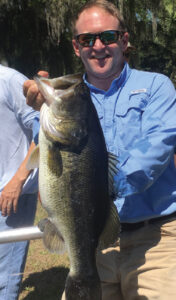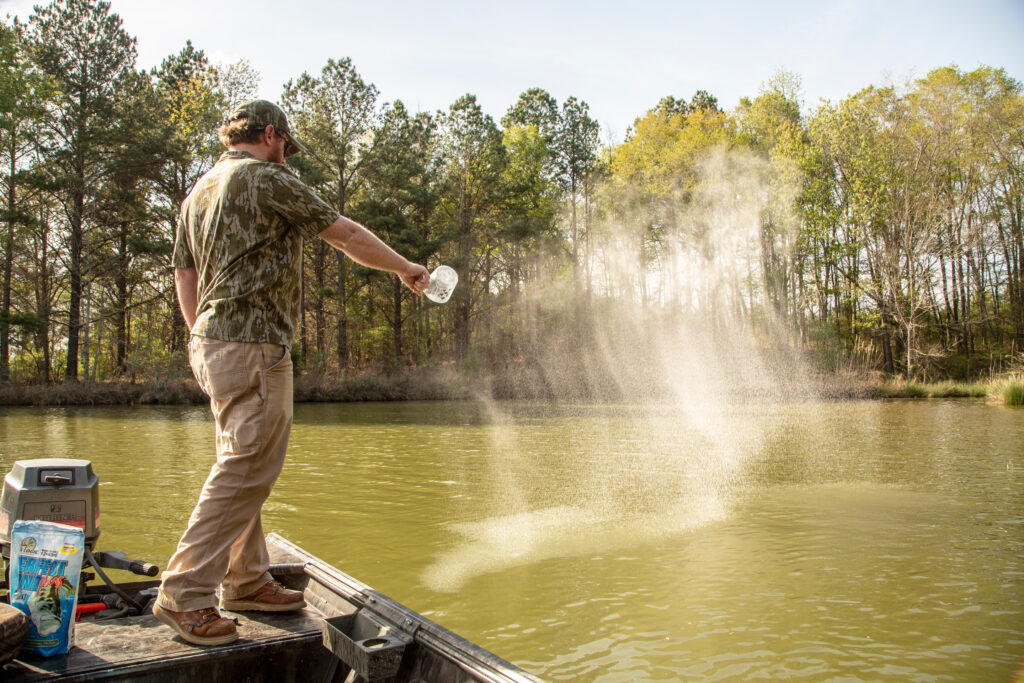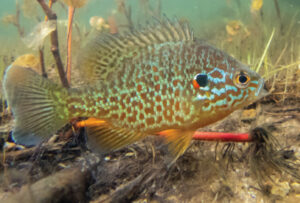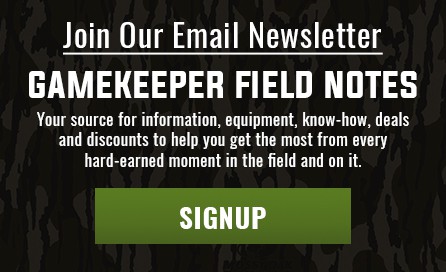1) What’s the most important part of managing a pond that you see overlooked?
 Harvest of bass and crappie is the most important, an often overlooked aspect of pond management. An owner can spend thousands of dollars stocking, fertilizing, liming, and feeding without any positive results if the predator population is too dense. The best, most productive ponds that I have the opportunity to manage are heavily used ponds that encourage harvest. Bass under 15” in length and all crappie should be harvested to allow the resident population to prosper.
Harvest of bass and crappie is the most important, an often overlooked aspect of pond management. An owner can spend thousands of dollars stocking, fertilizing, liming, and feeding without any positive results if the predator population is too dense. The best, most productive ponds that I have the opportunity to manage are heavily used ponds that encourage harvest. Bass under 15” in length and all crappie should be harvested to allow the resident population to prosper.
2) Typically, when do you start fertilizing your ponds and when do you stop?
It depends upon your location and current nutrient levels as to when, or if you should fertilize at all. Ponds that already receive nutrients from the watershed, like nutrients from a cattle pasture or from the application of fertilizer in an agricultural area, usually do not need additional fertilizer. Ponds should not be fertilized if a commercial feed is provided to fish. Ponds that are muddy or weedy, have existing dense plankton blooms, have fish populations that are out of balance, or have excessive water flow should not be fertilized.

With that said, I generally begin fertilizing when the water approaches the mid-60’s F. For my area, this occurs during mid to late March. Once I begin fertilization I continue the process through October. It is extremely important that the pond has an adequate bloom (18-20”) throughout this period to maximize fish production and restrict light penetration to the bottom to control submersed vegetation.
3) Is it equally important to take bluegills out of a pond as it is bass?
 No, bluegill production fuels growth of predators such as bass and crappie. If a pond owner wishes to harvest bluegill I always recommend keeping a few of the larger, older individuals. However, a pond can stay balanced without bluegill harvest, if bass are present. Bass must be harvested annually to maintain the balance of the pond.
No, bluegill production fuels growth of predators such as bass and crappie. If a pond owner wishes to harvest bluegill I always recommend keeping a few of the larger, older individuals. However, a pond can stay balanced without bluegill harvest, if bass are present. Bass must be harvested annually to maintain the balance of the pond.
4) If people would do one thing annually for their pond, what would you encourage them to do?
In addition to some predator harvest, I would encourage pond owners to begin a consistent fertilization program, where applicable. Fertilized ponds can hold up to four times more fish than an unfertilized pond. This will increase growth and reproduction rates of all fish. I would advise any owner to check the water quality of the pond before beginning a program. In some cases, limestone must be added to increase the alkalinity before the benefits of fertilization can be realized. Any submersed weed or algae growth should also be addressed before fertilizing.
Roger Burge is the owner of “Georgia Plantation Solutions,” (Richmond Hill, GA). They are a full-service aquatic management company with years of experience in fisheries and pond management. They offer a wide range of services including; weed control, electro-fishing, population analysis, stocking, liming, fertilizing, aeration, and water quality analysis and can customize a management plan to meet the individual goals of the pond owner. More information regarding their services may be viewed at (gaplantationsolutions.com).
Join our weekly newsletter or subscribe to GameKeepers Magazine.
Your source for information, equipment, know-how, deals, and discounts to help you get the most from every hard-earned moment in the field.







